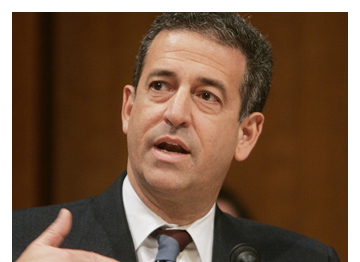Even before the voters of Iowa and New Hampshire play their traditional role in winnowing the field of presidential contenders, White House dreamers have to survive something even more daunting — the “Me Primary.” That is the point-of-no-return moment when each putative president stares at the reflection in the bathroom mirror and asks, “Do I really want to do this?”
Russ Feingold, the three-term Wisconsin senator with an unswerving voting record against the Iraq war and the Patriot Act, has become the latest Democrat to say, in effect, “include me out.” In an open letter e-mailed to supporters Saturday, Feingold declared, “If I really wanted to run for President, regardless of the odds or other possible candidates, I would do so. However, to put my family and all my friends through such a process without having a very strong desire to run seems inappropriate to me.”
Make no mistake, Feingold would not have been the 2008 Democratic nominee. The Democrats may be prepared to nominate the first woman for president or the first African-American, but they were not going to hand the nomination to a 53-year-old, twice-divorced Jewish reformer who has built his Senate career around avoiding the easy compromises of public life.
Unlike Hillary Clinton, Feingold lacks a national fundraising machine or widespread name recognition beyond the liberal blogger community. Unlike Barack Obama, the ever-earnest Feingold lacks that magic elixir called charisma that inspires audiences to identify with the idea of a candidate and not just his or her narrow issue positions. Feingold himself told the Milwaukee Journal Sentinel, “It would have required the craziest combination of things in the history of American politics to make it work.” But presidential politics is about more than the narrow calculus of who has the most money, the most fervent supporters and ultimately the most votes. It is also an ongoing debate about what a party believes and what its nominee dreams of achieving as president. During the 2000 GOP race, the ax-the-tax candidacy of magazine publisher Steve Forbes lured an admittedly willing George W. Bush into a political bidding war over which Republican was more fiscally imprudent. As a result, it is not too much of a stretch to talk about the deficit-creating, Bush-Forbes tax cuts.
Feingold might well have played an analogous gadfly role by challenging timorous Democrats in the 2008 contest. Addressing the New Hampshire Democratic state convention in June, Feingold pointedly reminded the 800 party activists in the audience, “The Democrats were in the majority in the United States Senate when we voted for the Iraq war and we passed the USA Patriot Act. It’s not enough to be just in the majority. You have to stand for something.”
Sharing the limelight with Feingold in New Hampshire five months ago was none other than former Virginia Gov. Mark Warner, a potentially strong presidential contender who withdrew from the competition in October. Suddenly, in fact, there is a large segment of not-for-Hillary Democratic voters up for grabs now that Warner and Feingold have both been winnowed out by the Me Primary. John Kerry too, if he boasts an ounce of self-awareness (a questionable proposition), should also consign himself to the sidelines after his maladroit Iraq “joke” right before the midterm elections jeopardized Democratic congressional gains.
It is tempting to portray Feingold as the first victim of Obama-mania, since the 2004 Democratic Convention keynote speaker also opposed the Iraq war when he was an Illinois state senator. Feingold, in fact, told the Journal Sentinel over the weekend, “I would be happy if Obama or [Al] Gore ran,” praising both men for speaking out during the Democrats’ me-too phase. Yet it is also quite possible — given the sudden Democratic consensus in favor of redeployment and eventual withdrawal — that Iraq will not be the divisive issue in the 2008 Democratic primaries that it has been, since Clinton, Kerry, John Edwards, Joe Biden, Evan Bayh and Chris Dodd all voted for the invasion.
Edwards, in fact, could be a major beneficiary of Feingold’s departure from the race. Despite his hawkish statements during the run-up to war, Edwards publicly recanted his Iraq vote last year. With his emphasis on eradicating poverty in America and his repositioning on foreign policy, Edwards was preparing to challenge Feingold for the allegiance of the idealistic wing of the Democratic Party. But as leading Edwards supporters freely admit, the 2004 vice-presidential nominee runs the risk of being permanently upstaged by the frenzy that would surround Obama if, as many insiders anticipate, he becomes a candidate.
The Warner and Feingold examples should serve as a reminder that nothing is certain in presidential politics this far in advance — not even the identities of the candidates. Even if the Democratic contest ends up being dominated by the history-making duo of Clinton and Obama, there will be opportunities for other candidates to, at least momentarily, break from the pack. (Remember that Howard Dean and John McCain were marginal figures at this point four and eight years ago.) Still, the 2008 Democratic primaries would have been zestier and more diverse with Russ Feingold quixotically representing the party’s left flank.


